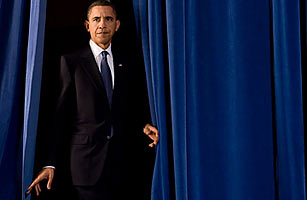
President Obama in Washington on Nov. 5, 2009
The last time President Barack Obama made a trip to Copenhagen was in October — his sudden, last-minute effort to promote Chicago's 2016 Olympic bid — only to see his home city fail to even make the first cut. So, you couldn't blame the President if he decided to say farvel ("farewell" in Danish) to Copenhagen for the rest of his time in office.
He may not have a choice, though. The delightful, livable Scandinavian capital, with excellent bike lanes and friendly people, is the site of next month's vital U.N. summit on climate change, where the world's governments are meant to negotiate a successor to the Kyoto Protocol. Environmentalists are pressing global leaders to show up in person. At last count, about 40 have said they will make the trip, including British Prime Minister Gordon Brown and French President Nicolas Sarkozy, along with scores of politicians from the developing nations that will be most vulnerable to climate change. Although the work of the summit will be carried out by ministers and bureaucrats, the mere presence of heads of state in the room in Copenhagen could add momentum to faltering negotiations.
No leader's appearance at Copenhagen would be more important than Obama's. Although the U.S. is no longer the world's top carbon emitter (that title has been ceded to China and its runaway economic growth), America remains the key player at Copenhagen. The European Union has already pledged to make relatively deep cuts in emissions between now and 2020, but it accounts for a shrinking slice of the carbon pie. If the U.S. were to arrive in Copenhagen with specific targets for emissions cuts, it might be able to break the deadlock between developed and developing countries and finally shove the world toward a new climate deal.
If Obama attended Copenhagen personally — and wielded the oratorical skills that helped his presidential campaign triumph in 2008 — he would add prestige to the proceedings and make it harder for diplomats to leave the Danish city without a real treaty. "It would seem that a country that takes climate change seriously would want its head of state in Copenhagen," says Keya Chatterjee, the U.S. acting director of the World Wildlife Fund's climate-change program. "The whole world is being asked to trust the U.S., but the global community can't take it seriously if Obama isn't there."
So will the President make his way to the city of Hans Christian Andersen and Soren Kierkegaard? So far the White House has played coy, saying there have been no concrete plans one way or another. But in an interview with Reuters on Monday, Obama gave his strongest indication yet that he might make the trip. "If I am confident that all the countries involved are bargaining in good faith and we are on the brink of a meaningful agreement and my presence in Copenhagen will make a difference in tipping us over the edge, that's certainly something I would do," he said.
Of course, as the talks stand now, we might need Obama's presence in Copenhagen before negotiations reach the "brink of a meaningful agreement." The reality is that while the world was cheered by Obama's election and his stated commitment to fighting climate change, the U.S. is still hampered by years of inaction under former President George W. Bush. Washington has a long way to go to earn back the trust of European nations that have been leading the way in its absence, and of developing nations that will bear the brunt of global warming. But as Obama learned during the Olympic bid process, it's not a good idea for a head of state to make a lobbying visit unless he can be sure of a positive outcome — and so far a positive outcome is far from certain at Copenhagen, no matter who attends. It's a conundrum that could keep Obama on the sidelines next month.